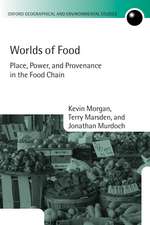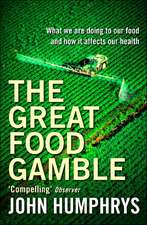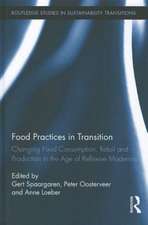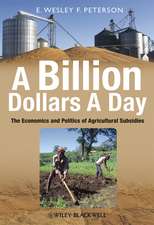British Agriculture in the First World War (RLE The First World War): Routledge Library Editions: The First World War
Autor Peter Deweyen Limba Engleză Paperback – 21 ian 2016
| Toate formatele și edițiile | Preț | Express |
|---|---|---|
| Paperback (1) | 416.22 lei 6-8 săpt. | |
| Taylor & Francis – 21 ian 2016 | 416.22 lei 6-8 săpt. | |
| Hardback (1) | 1002.63 lei 6-8 săpt. | |
| Taylor & Francis – 4 mar 2014 | 1002.63 lei 6-8 săpt. |
Preț: 416.22 lei
Nou
Puncte Express: 624
Preț estimativ în valută:
79.64€ • 83.60$ • 66.11£
79.64€ • 83.60$ • 66.11£
Carte tipărită la comandă
Livrare economică 10-24 aprilie
Preluare comenzi: 021 569.72.76
Specificații
ISBN-13: 9781138965058
ISBN-10: 1138965057
Pagini: 278
Dimensiuni: 156 x 234 x 15 mm
Greutate: 0.45 kg
Ediția:1
Editura: Taylor & Francis
Colecția Routledge
Seria Routledge Library Editions: The First World War
Locul publicării:Oxford, United Kingdom
ISBN-10: 1138965057
Pagini: 278
Dimensiuni: 156 x 234 x 15 mm
Greutate: 0.45 kg
Ediția:1
Editura: Taylor & Francis
Colecția Routledge
Seria Routledge Library Editions: The First World War
Locul publicării:Oxford, United Kingdom
Public țintă
General, Postgraduate, Professional, and UndergraduateCuprins
1. Introduction 2. Farming and Food Supply Before 1914 Part 1: 1914-16: Business as Usual 3. The Evolution of Policy 4. Recruiting and Farm Labour 5. Power and Machinery 6. Fertilisers and Feeds 7. Farming in Wartime Part 2: 1917-18: Farming As A Controlled Industry 8. Policy: The Peak of Intervention 9. Labourers, Soldiers, Prisoners and Women 10. Tractors and Machinery 11. Fertilisers and Feeds 12. The Work of the County Executive Committees Part 3: The Achievement 13. The Success of the Plough Policy 14. The Output of Agriculture, 1914-1918 15. Farming and Food Supply 16. Farmer, Landowner and Labourer 17. The Legacy
Notă biografică
Multivolume collection by leading authors in the field
Descriere
This volume comprehensively describes how British farmers coped with the problems of shortage of labour and other factors of production, as well as assessing how well agriculture performed as a supplier of food to the nation. Use of previously neglected records provides much evidence on issues such as the deployment of substitute labour and the introduction of the tractor into British farming for the first time. Challenging accepted view on the period, the author shows that shortages of labour and other factors of production had only a slight effect on farm output and the national food supply.






















